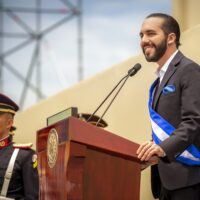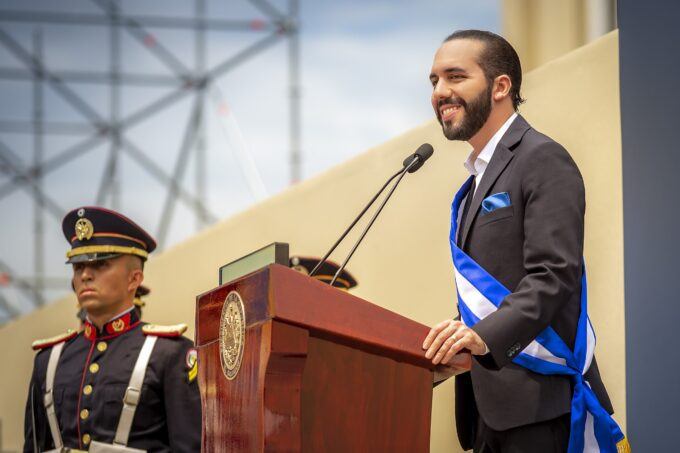

Photograph Source: Casa Presidencial – CC0
Mexican president Andrés Manuel López Obrador stood on the right side of history when he called upon Guatemalan authorities to respect president-elect Bernardo Arévalo’s electoral victory. But when it comes to El Salvador, AMLO has failed to address the human rights crisis under President Nayib Bukele’s regime of exception. This is a grave omission.
On December 8, the Guatemalan Attorney General’s Office declared the general and presidential elections invalid, despite not having the authority to certify or annul elections. This provoked a swift and strong reaction from the international community. AMLO, the Organization of American States, the EU Diplomatic Service, the U.S. State Department, and a slew of national and international organizations joined together in calling on Guatemalan authorities to ensure a peaceful transfer of power in January. The U.S. government even imposed visa restrictions on nearly 300 Guatemalan public officials and private citizens for undermining democracy and the rule of law in the country. Fortunately, only six days later, the Constitutional Court stepped in, ordering Congress “to guarantee the effective inauguration of all elected officials in the 2023 electoral process, in accordance with official rights and validation of results.”
In stark contrast to the international response to defend the democratic process in Guatemala, there is a deafening silence regarding the erosion of democracy and human rights in another Central American country: El Salvador.
Set to be published in January, a report by an international delegation to El Salvador details how — abusing the pretext of public safety — President Bukele has reduced the independence of the judiciary, violated basic human rights, suspended civil liberties, and upended the rule of law.
Bukele’s regime has imprisoned more than 70,000 people. Prisoners are subjected to torture, degrading treatment, and the deprival of basic necessities. Of those imprisoned, thousands are innocent, including prominent environmentalists — such the water defenders known as the Santa Marta Five — and numerous trade union leaders. There is also strong evidence that Bukele wishes to violate the Salvadoran legislature’s 2017 unanimous decision to ban mining, an antidemocratic move that would endanger the country’s water supply and violate popular will.
It gets worse: The Constitutional Court ruled that Bukele is eligible for re-election. As in Mexico, serving as president for more than one five-year term was prohibited by the Constitution. But in 2021, Bukele appointed new judges to the Constitutional Court, and they are taking his side. Imagine if AMLO were to attempt something of this magnitude and insolence, bypassing constitutional provisions that enshrine Mexico’s founding principle of “Effective Suffrage, No Reelection.” How would the world react?
Despite calls from Salvadoran civil society organizations and their international allies, the governments of the United States, Canada, the European Union and Mexico have turned a blind eye. Not only do they fail to criticize Bukele’s actions, they continue to back his government. Therefore, faced with the ongoing negotiations between the Bukele government and the IMF for a new loan, the Institute for Policy Studies and seven other international organizations concerned with anti-corruption policy, access to public information, and respect for human rights, sent a letter on December 11 to the U.S. Secretary of the Treasury Janet Yellen. In the letter, the organizations request that the IMF’s U.S. representative tack on a crucial condition to the $1.3 billion loan, requiring the fulfillment of anti-corruption, transparency, and human rights measures.
Mexico should take a stance and defend the Chapultepec Peace Accords — signed in 1992 in Mexico City — and the National Reconciliation Law, which remain in force to date. This agreement was negotiated under the auspices of the Secretary General of the United Nations, signed by representatives of the government of El Salvador and the FMLN insurgency, and even sponsored by Spain, Colombia and Venezuela.
But Bukele has declared them a sham. When AMLO visited El Salvador in May 2022, he recalled that Mexico proposed the creation of the Contadora Group, through which peace was achieved, and that it is a source of pride for us Mexicans, since those agreements were signed at Chapultepec Castle in Mexico City.
Despite Bukele’s apparent success in pacifying El Salvador’s gangs, members of civil society and religious organizations in the United States and Canada who visited El Salvador in October informed us that they were surprised by the fear, suffering, and corruption in the country. Fear because arrests are so arbitrary and sudden that many parents fear every night that their teenage children may be picked up by police. This fear has led to an increase in migration to the United States, particularly by youths. The Cristosal organization reports 3,516 cases of human rights violations committed by state agents on the pretext of the state of exception. Of the victims, 57.6 percent are men and women aged 18 to 30.
Following the attempts to deny electoral results, international support has proven essential for Guatemalan democracy. Even after taking office, President Bernardo Arévalo will continue to need the support of the international community in order to freely exercise his presidential powers. However, the international community needs to pay closer attention to El Salvador, where the authoritarian Bukele has hijacked the transition from violent conflict to peaceful democracy.
The post Guatemala and El Salvador: the Contradictions of International Support appeared first on CounterPunch.org.
This content originally appeared on CounterPunch.org and was authored by Manuel Perez-Rocha.
Manuel Perez-Rocha | Radio Free (2023-12-29T06:54:02+00:00) Guatemala and El Salvador: the Contradictions of International Support. Retrieved from https://www.radiofree.org/2023/12/29/guatemala-and-el-salvador-the-contradictions-of-international-support/
Please log in to upload a file.
There are no updates yet.
Click the Upload button above to add an update.